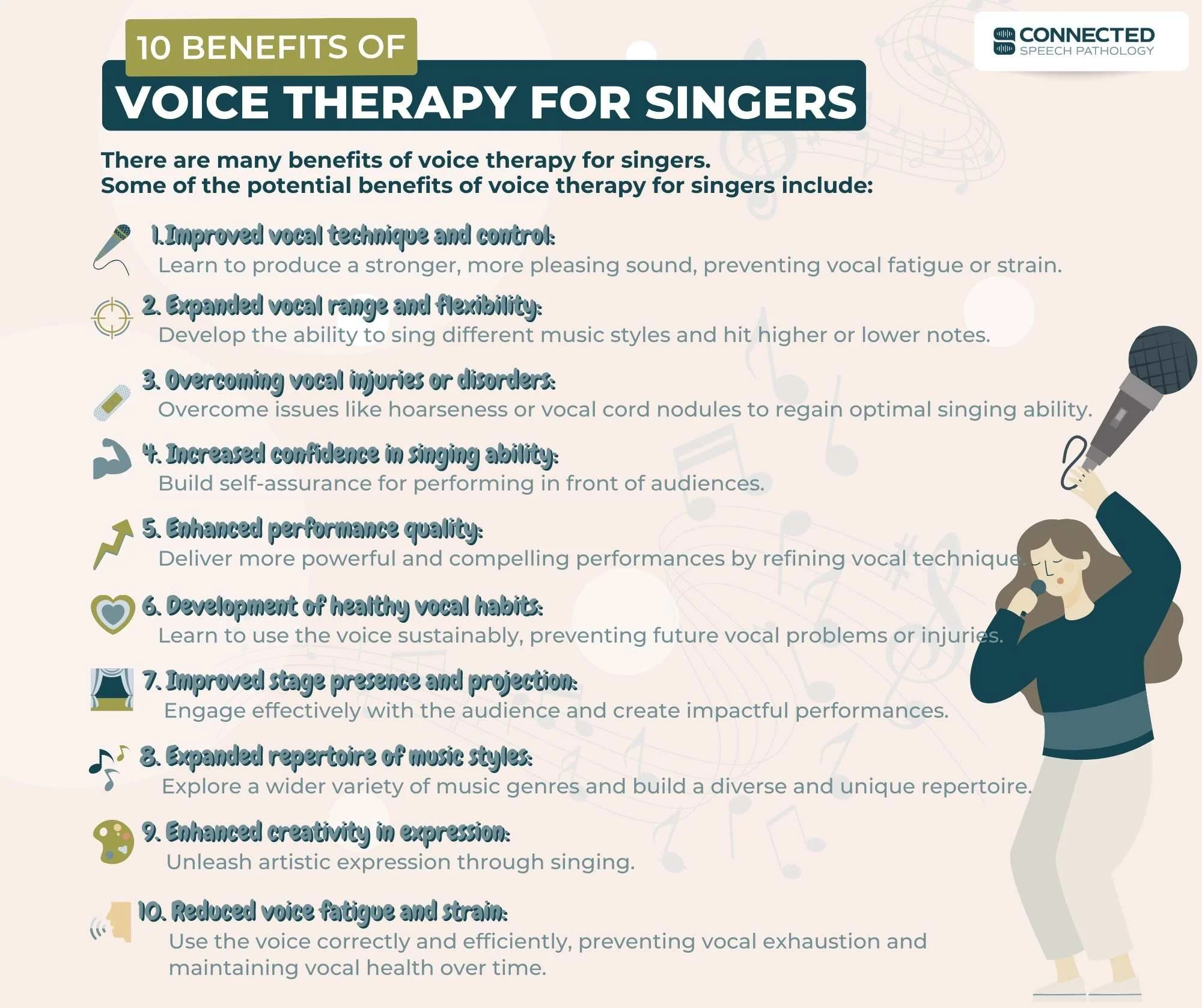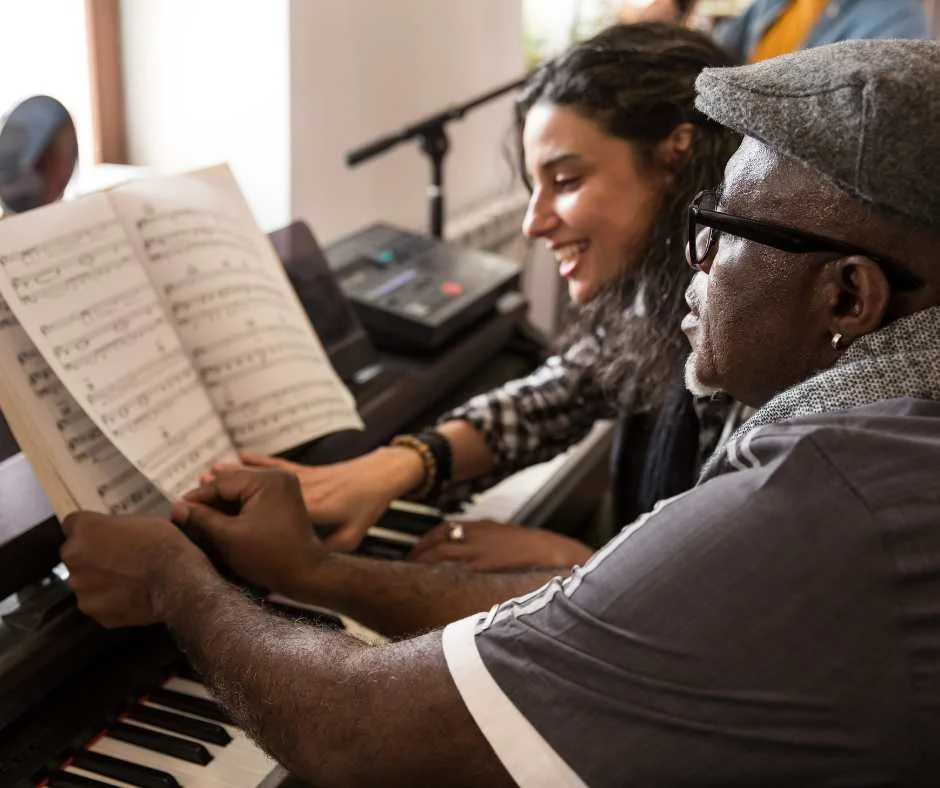Voice Therapy for Singers
People sing as a form of self-expression, using their voices to communicate their feelings, thoughts, and emotions. People also sing for the joy and pleasure it brings them or to connect with others and create a sense of community.
Sometimes singers struggle with vocal fatigue, sore throats, or a hoarse voice due to damage caused by improper technique, misuse, or overuse. Voice therapy can be particularly beneficial for singers to develop a better vocal technique, expand their vocal range, and overcome vocal injuries or disorders.
This article explains how voice treatment can help you become a more effective singer and avoid vocal problems. The following topics will be covered:
What is Voice Therapy, and Why do Singers Need It?
10 Benefits of Vocal Therapy for Singers
What to Expect From Voice Therapy for Singers?
How to Practice in Between Voice Therapy Sessions
What is Voice Therapy, and Why do Singers Need It?
Voice therapy, also known as speech therapy or vocal therapy, is a form of treatment that helps individuals improve the function and quality of their voice. It is typically used to help individuals with voice disorders or difficulties with voice production, such as hoarseness, vocal fatigue, or problems with pitch or volume control problems.
Singers, in particular, may need voice therapy if they are experiencing difficulty with their singing technique or vocal range or have sustained a vocal injury. Voice therapy can help singers learn how to use their voices properly and effectively. It also helps them develop better control over their voices, improve vocal tone, and expand their range.
Voice therapy may involve various techniques and exercises, such as breath control exercises, vocal warm-ups, and exercises specifically designed to improve pitch and resonance.
Voice therapy is usually provided by a speech-language pathologist specializing in voice disorders. It may be provided individually or in a group setting and involve either in-person or online sessions.
10 Benefits of Vocal Therapy for Singers
There are many benefits of voice therapy for singers. Some of the potential benefits of voice therapy for singers include:
Improving vocal technique
Voice therapy can help singers develop better vocal technique and control by showing singers how to produce a more robust and pleasing sound which also helps prevent vocal fatigue or strain. Teaching proper voice therapy techniques can help singers train their voices to get the best sound possible.
Enhancing vocal range
Voice therapy can help singers expand their vocal range and increase flexibility, allowing them to sing different music and styles.
Overcoming vocal injuries or disorders
If a singer is experiencing problems with their voice, such as hoarseness or nodules on the vocal cords, voice therapy can help them overcome these issues and get back to singing at their best.
Building confidence
Voice therapy can help singers build confidence in their singing ability, which can be especially important when performing in front of an audience.
Improving performance
By improving their vocal technique and overcoming vocal injuries or disorders, singers can improve the overall quality of their performances and deliver more powerful and compelling performances.
Developing healthy vocal habits
Voice therapy can help singers learn how to use their voice in a healthy and sustainable way, which can help prevent vocal problems and injuries in the future.
Improving stage presence
Voice therapy can help singers develop better stage presence and projection, allowing them to engage more effectively with their audience and deliver more impactful performances.
Expanding repertoire
By improving their vocal technique and expanding their vocal range, singers can explore a wider variety of music and styles, which can help them build a more diverse and unique repertoire.
Enhancing creativity
Voice therapy can help singers tap into their creativity and find new ways to express themselves through their singing.
Reducing voice fatigue
Voice fatigue can cause vocalists to lose the ability to perform certain songs or even lose their voice altogether. A singing voice specialist helps reduce vocal fatigue by teaching singers how to use their voices correctly and efficiently, so they don't strain their voices. Learning the proper technique will help singers maintain their voices over time.
What to Expect From Voice Therapy for Singers?
A person can expect many things from voice therapy for singers. Here are some of the things that a person may experience during voice therapy sessions:
Initial evaluation
During the first session, the speech-language pathologist will conduct an initial evaluation to assess the individual's vocal abilities and identify any areas that need improvement. The initial session may include an analysis of the individual's voice production and vocal characteristics and a medical and developmental history interview.
Treatment plan
The speech-language pathologist will develop a personalized treatment plan based on the initial evaluation results that address the individual's specific needs and goals. The treatment plan may include a variety of techniques and exercises designed to improve the function and quality of the voice, such as vocal training techniques and instruction in breath support, posture adjustment, diet recommendations, lifestyle modifications, and other elements of successful singing.
Regular sessions
Voice therapy for singers typically involves regular sessions with a speech-language pathologist. These sessions may be held in person or online and provided individually or in a group setting. The frequency and length of the sessions will depend on the individual's needs and goals.
Home practice
In addition to regular sessions with a speech-language pathologist, individuals may be asked to practice specific techniques and exercises at home to help improve their vocal function and quality.
Progress evaluation
As treatment progresses, the speech-language pathologist will regularly evaluate the individual's progress and adjust the treatment plan as needed.
Overall, voice therapy for singers involves working with a speech-language pathologist to develop a personalized treatment plan and participating in regular sessions to improve the function and quality of the voice. It may also involve practicing specific techniques and exercises at home. Voice therapy exercises are not only beneficial for singers but can also be helpful for anyone looking to improve their vocal abilities or speaking voice.
How to Practice in Between Voice Therapy Sessions
Here are some tips for practicing singing voice therapy techniques on your own:
Start with vocal warm-ups
Vocal warm-ups help prepare the vocal cords for singing by increasing blood flow and flexibility. Some simple vocal warm-ups that you can try include humming, lip trills, and glides.
Practice breath control exercises
Breath control exercises can help you learn to use your breath more effectively when singing. Some exercises you can try include deep breathing, slow exhales, and sustained phonation.
Work on pitch control
Pitch control exercises can help you improve your ability to control and maintain pitch when singing. You can practice singing scales or arpeggios or try singing melodies and focusing on hitting specific pitch targets.
Focus on resonance
Resonance exercises can help you improve the projection and resonance of your voice. You can sing vowel sounds and focus on resonating the sound in different areas of your body, such as your chest, head, or nasal cavity.
Record and listen to yourself
As you practice, recording yourself singing and listening back to hear how you sound can be helpful. By recording yourself, you can help identify areas that need improvement and better understand how you are progressing.
It's important to remember that singing voice therapy techniques should be practiced slowly and gradually, and you should not push yourself beyond your limits. If you are experiencing discomfort or strain while singing, take a break and consult with a speech-language pathologist for guidance.
The Importance of Vocal Rest
Vocal rest is important because it allows the vocal cords to rest and heal. The vocal cords are a pair of thin, flexible muscles in the larynx (voice box) that vibrate to produce sound when we speak or sing. Using our voice excessively or improperly can cause strain or damage to the vocal cords, leading to vocal problems such as hoarseness, nodules, or polyps.
Vocal rest involves reducing or avoiding the use of the voice as much as possible. Vocal rest may involve avoiding talking, singing, or shouting or limiting your time speaking or singing each day. Vocal rest may also include avoiding activities that irritate the vocal cords, such as smoking or exposure to polluted air.
Vocal rest is often recommended for individuals experiencing vocal problems or having surgery on the vocal cords. It is also essential for singers to incorporate periods of vocal rest into their routine to prevent vocal strain and maintain healthy vocal habits.
Overall, voice rest is a tool that is used frequently to maintain the vocal cords' health and function and to prevent vocal problems and injuries.
Frequently Asked Questions About Voice
What are the vocal folds?
The vocal cords are a pair of thin, flexible muscles in the larynx (voice box). Vocal cords are also called "vocal folds." The vocal folds are responsible for producing sound when we speak or sing. They are made up of elastic tissue covered by a layer of mucous membrane. When we inhale, the vocal folds are relaxed and open, allowing air to pass through the larynx and into the lungs. When we exhale, the vocal folds come together and vibrate as the air passes through them. This vibration produces sound waves that we hear as our voices.
The vocal folds are controlled by several muscles in the larynx and can be adjusted to produce different pitches and volumes. The pitch of the voice is determined by the tension of the vocal folds, with higher pitches produced by tighter, shorter folds and lower pitches produced by looser, longer folds. The volume of the voice is determined by the amount of air passing through the vocal folds and the intensity of the vibrations.
The vocal folds are an essential part of the voice production system for speaking, singing, and communicating with others. Dysfunction or damage to the vocal folds can lead to voice disorders or difficulties with voice production, such as hoarseness, vocal fatigue, or problems with pitch or volume control.
Can an injured singing voice be restored?
An injured singing voice can often be restored, although the length and success of the recovery process can vary depending on the cause and severity of the injury. Sometimes, a period of vocal rest may be sufficient to allow the vocal cords to heal, while in other cases, more intensive treatment may be necessary.
If an individual is experiencing problems with their singing voice, it is important to consult a healthcare professional, such as a speech-language pathologist or an otolaryngologist (ear, nose, and throat specialist). These professionals can help to determine the cause of the injury and develop a treatment plan. Treatment may involve a combination of vocal rest, medication, and vocal exercises to help the individual regain control and function of their voice.
It is essential to follow the treatment plan provided by the healthcare professional and to avoid using the voice excessively or improperly during the recovery process. With proper treatment and care, it is often possible to restore an injured singing voice and return to singing at full strength.
How Connected Speech Pathology Can Help
Connected Speech Pathology provides speech therapy and voice therapy services, including treatment for singers. Our speech-language pathologists can help singers restore their voices and preserve vocal health by providing them with various techniques and exercises to improve the function and quality of their voices.
Our voice therapy services include a comprehensive initial evaluation to assess the singer's vocal abilities and identify areas that need improvement. We will help develop a personalized treatment plan based on the initial evaluation results that address the singer's specific needs and goals.
We provide regular therapy sessions conveniently delivered online from the comfort of your home. We offer guidance for home practice to help singers continue to improve their vocal function and quality.
If you are a singer experiencing difficulty with your vocal abilities, don't hesitate to contact Connected Speech Pathology today to discuss how we can help you restore and preserve your singing voice. Our team of knowledgeable speech-language pathologists is dedicated to helping singers reach their goals and get back on track! Contact us today to get started. We look forward to hearing from you!
About the Author
Allison Geller is a speech-language pathologist (SLP) and the owner of Connected Speech Pathology. She obtained her Bachelor’s and Master’s degrees from the University of Florida in Speech-Language Pathology. Allison has practiced speech therapy in a number of settings including telepractice, acute care, outpatient rehabilitation, and private practice. She has worked extensively with individuals across the lifespan including toddlers, preschoolers, school-aged children, and adults. She specializes in the evaluation, diagnosis, and treatment of a variety of communication disorders including receptive/expressive language disorders, articulation disorders, voice disorders, fluency disorders, brain injury, and swallowing disorders.
Allison served as the clinical coordinator of research in aphasia in the Neurological Institute at Columbia University Medical Center in New York. She is on the Board of Directors for the Corporate Speech Pathology Network (CORSPAN), a Lee Silverman Voice Treatment (LSVT) certified clinician, and a proud Family Empowerment Scholarship/Step-Up For Students provider. Allison is passionate about delivering high quality-effective treatment remotely because it’s convenient and easy to access. What sets us apart from other online speech therapy options is—Allison takes great care to hire the very best SLPs from all over the country.









